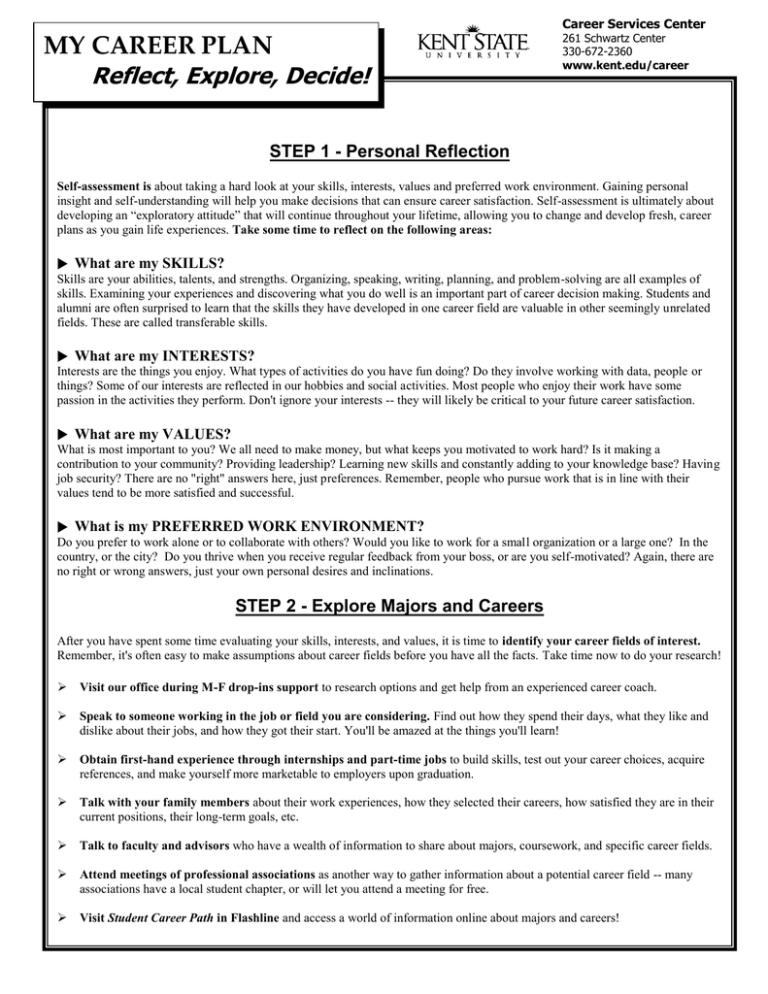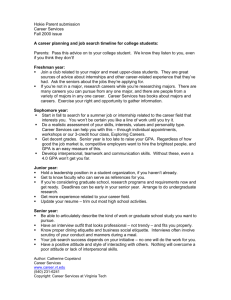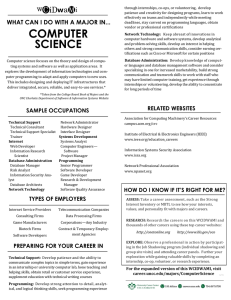Career Planning Guide: Reflect, Explore, Decide!
advertisement

Career Services Center MY CAREER PLAN Reflect, Explore, Decide! 261 Schwartz Center 330-672-2360 www.kent.edu/career STEP 1 - Personal Reflection Self-assessment is about taking a hard look at your skills, interests, values and preferred work environment. Gaining personal insight and self-understanding will help you make decisions that can ensure career satisfaction. Self-assessment is ultimately about developing an “exploratory attitude” that will continue throughout your lifetime, allowing you to change and develop fresh, career plans as you gain life experiences. Take some time to reflect on the following areas: What are my SKILLS? Skills are your abilities, talents, and strengths. Organizing, speaking, writing, planning, and problem-solving are all examples of skills. Examining your experiences and discovering what you do well is an important part of career decision making. Students and alumni are often surprised to learn that the skills they have developed in one career field are valuable in other seemingly unrelated fields. These are called transferable skills. What are my INTERESTS? Interests are the things you enjoy. What types of activities do you have fun doing? Do they involve working with data, people or things? Some of our interests are reflected in our hobbies and social activities. Most people who enjoy their work have some passion in the activities they perform. Don't ignore your interests -- they will likely be critical to your future career satisfaction. What are my VALUES? What is most important to you? We all need to make money, but what keeps you motivated to work hard? Is it making a contribution to your community? Providing leadership? Learning new skills and constantly adding to your knowledge base? Having job security? There are no "right" answers here, just preferences. Remember, people who pursue work that is in line with their values tend to be more satisfied and successful. What is my PREFERRED WORK ENVIRONMENT? Do you prefer to work alone or to collaborate with others? Would you like to work for a small organization or a large one? In the country, or the city? Do you thrive when you receive regular feedback from your boss, or are you self-motivated? Again, there are no right or wrong answers, just your own personal desires and inclinations. STEP 2 - Explore Majors and Careers After you have spent some time evaluating your skills, interests, and values, it is time to identify your career fields of interest. Remember, it's often easy to make assumptions about career fields before you have all the facts. Take time now to do your research! Visit our office during M-F drop-ins support to research options and get help from an experienced career coach. Speak to someone working in the job or field you are considering. Find out how they spend their days, what they like and dislike about their jobs, and how they got their start. You'll be amazed at the things you'll learn! Obtain first-hand experience through internships and part-time jobs to build skills, test out your career choices, acquire references, and make yourself more marketable to employers upon graduation. Talk with your family members about their work experiences, how they selected their careers, how satisfied they are in their current positions, their long-term goals, etc. Talk to faculty and advisors who have a wealth of information to share about majors, coursework, and specific career fields. Attend meetings of professional associations as another way to gather information about a potential career field -- many associations have a local student chapter, or will let you attend a meeting for free. Visit Student Career Path in Flashline and access a world of information online about majors and careers! STEP 3 - Make Major & Career Decisions A successful career is not achieved by a one-time “snap” decision. Career planning is a continuous process – a series of choices. The career choices you make are not stagnant, and will evolve over your lifetime. While making decisions about your major and career can be difficult, the more effort you put into self-assessment and exploring careers, the more easily you should be able to make a decision you are comfortable with. Remember, most people change career fields numerous times over their lifetime. Consider the following factors and resources as you bring it all together! Decision-Making Style How you approach problem solving will differ based on your decision-making style. Decision making styles are determined by “how” you make decisions - either spontaneously or systematically, and “where” you make decisions - either internally or externally. Spontaneous decision makers make decisions quickly based on what feels right. Systematic decision makers seldom act impulsively and gather a great deal of information before making decisions. Internal decision makers analyze problems silently and privately, they “think and then talk.” External decision makers like to bounce ideas off of others, they often “talk and then think.” Gain insight into your decision-making style by completing the decision-making exercise in Collage: A Kent State to Career Portfolio, at www.kent.edu/career. Prioritize Keep in mind that no career can possibly meet all of your needs. You will have to do some prioritizing to select the career which meets your most important needs or allows you the flexibility to meet your needs outside of the workplace. Reflect on the skills and values that are the most important to you. Keep those in mind as you evaluate your choices. Career Paths For some academic programs, the connection between major and career is clearer than others. But remember, there are numerous career paths within a given career field. For example, an accountant can work in a large accounting firm, have his/her own business, or can be the only accountant in an industry completely different from the accounting field. Direct vs. Indirect Career Link Some majors relate directly to a career. In this case, the academic program directly correlates to a job and the training required for the profession. For example, an education major will pursue a teaching position and a nursing major a nursing position. However, most majors do not relate directly to one career path and can lead to a variety of careers depending on your interests, work/volunteer experiences, internships, co-curricular activities, values, etc. For example, a psychology major might pursue positions including non-profit advocate, probation officer, human resource professional, or marketing researcher. A career coach in our office can help you identify the many possibilities. STEP 4 - Take Action to Achieve Goals Once you have decided on a major and narrowed down your career interests, it is time to design a course of action! Activities to Achieve your Academic/Graduation Goal 1. Meet with academic and/or faculty advisors to develop a solid academic plan and monitor progress towards graduation 2. Join student and/or professional organizations related to your major 3. Maintain a strong G.P.A. and consider adding a minor to your degree program 4. If considering graduate school, research options and admission requirements Activities to Achieve your Career/Employment Goal 1. Meet with a career coach to confirm your aspirations 2. Begin creating a resume 3. Join a student organization to develop leadership and teamwork skills 4. Develop professional skills through part-time work and internships 5. Network by talking to individuals in your career field of interest 6. Participate in volunteer opportunities 7. Consider the benefits of studying abroad 8. Develop a list of professional references and request letters of recommendation 9. Visit Career Services for resume/cover letter assistance, job search strategies, and interview preparation 10. Meet with prospective employers by attending job and internship fairs and interviewing on campus Remember, there are no right or wrong decisions. Any decision involves some risk. Stay positive and keep your perspective! 11/15



